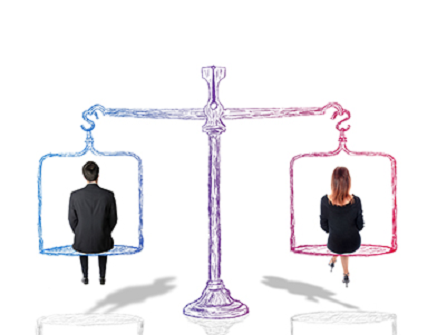What does it take to achieve gender equality in the workplace

What does it take to achieve gender equality in the workplace
In 2015, Actress Patricia Arquette used her Oscar winning speech to highlight the need for urgent action to address Gender Inequality, not just in Hollywood but throughout industries in America. Less than a year later, The Workplace Gender Equality Agency published their second annual scorecard covering nearly 4 million workers across 12,229 employers in Australia. Not only did the report confirm that it’s not just a ‘Hollywood issue’, but also a problem here at home highlighting the conspicuous degree of the disparity.
The graph below shows the representation of women in management positions, with the yellow portion showing the proportion of women in management jobs. The data shows that 36.5 per cent of managers overall are female, but women make up only 15.4 per cent of chief executive officer or head of business positions. The overall gender pay gap for full-time workers is 24 per cent, meaning men earn an average total of $27,000 a year more than women. The gap is even higher for female managers, excluding CEOs, who take home 29 per cent less than their male counterparts.
Source: Australia’s Gender Equality Scorecard, WGEA
Many organisations have already recognised gender inequality and taken measures to improve outcomes at the workplace; flexible work options such as working from home or varied start and finish times are now commonplace among many organisations. But are they really contributing to addressing gender inequality at the workplace?
The achievement of authentic gender equality requires a complete shift in the contemporary paradigms of thinking around work and also care giving. It demands the reinvention of what we consider work to be, what it looks like, how we organise, measure and reward it. Above all, it must be founded on the principle of diversity that is so often quoted as part of the Corporate Sustainability strategy of many organisations but remains in practice, elusive.
DFP and the Gender, Leadership and Social Sustainability Research Unit at Monash University have invited a diverse range of thought leaders, high achievers and everyday Australians to voice their version of effective change and solutions to the ongoing dilemma of gender equality in the workplace. Our panelists will pitch their idea for generating change and have been encouraged to be as innovative and creative as they dare! The event is designed to bring together innovative thinkers, fresh voices and agents of change to capitalise on the expertise and vision of the panel. Through outlier thinking, the ideas and content will no doubt be fresh and feasible – moving beyond the existing status quo on gender diversity.
Find out more about Generating Innovation and Commitment to Gender Equality and register for our forum in Melbourne on 20 July 2016.

